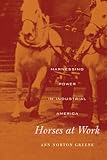The 1872 Energy Crisis
Posted by Big Gav in horse power
 The New York Times has a review of a book on the history of horse power (Horses at Work: Harnessing Power in Industrial America
The New York Times has a review of a book on the history of horse power (Horses at Work: Harnessing Power in Industrial America), including a segment describing an energy crisis caused by an outbreak of horse flu in the 1870's - A World of a Different Color.
Once upon a time, America derived most of its power from a natural, renewable resource that was roughly as efficient as an automobile engine but did not pollute the air with nitrogen dioxide or suspended particulate matter or carcinogenic hydrocarbons. This power source was versatile. Hooked up to the right devices, it could thresh wheat or saw wood. It was also highly portable — in fact, it propelled itself — and could move either along railroad tracks or independently of them. Each unit came with a useful, nonthreatening amount of programmable memory preinstalled, including software that prompted forgetful users once it had learned a routine, and each possessed a character so distinctive that most users gave theirs a name. As a bonus feature, the power source neighed.
But in the fall of 1872, almost all these power units, better known as horses, came down with the flu, and America faced an energy crisis. In what became known as the Great Epizootic, horse influenza spread from Ontario down the East Coast of the United States, across the South and into the West, eventually reaching as far as California and Nicaragua. Forty-eight hours after it hit Boston, seven out of every eight of the city’s horses were feverish and coughing. In “Horses at Work,” Ann Norton Greene describes Philadelphia at a standstill: “Streetcar companies suspended service; undelivered freight accumulated at wharves and railroad depots; consumers lacked milk, ice and groceries; saloons lacked beer; work halted at construction sites, brickyards and factories; and city governments curtailed fire protection and garbage collection.” The disaster prompted an appreciation of the work done by horses, which had been somewhat overshadowed by the more voguish pursuit of steam power, and The Nation went so far as to publish an essay with the Matthew Arnoldian title “The Position of the Horse in Modern Society.” Then as now, many had the idea that over the course of the 19th century the steam engine was fated to replace the horse. To the contrary, the Nation essayist asserted, “our dependence on the horse has grown almost pari passu with our dependence on steam.”






